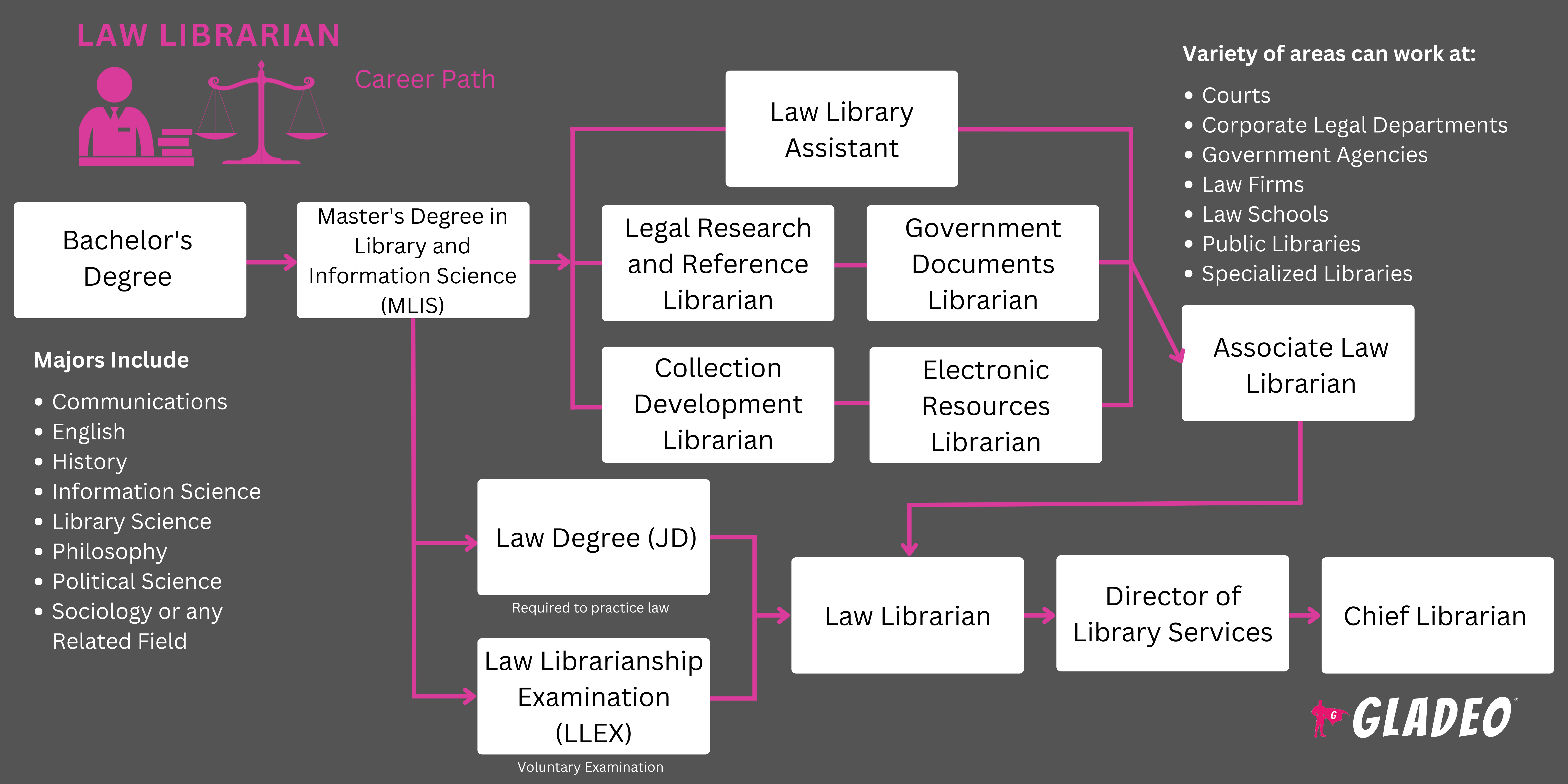Spotlights
Legal Information Specialist, Legal Research Librarian, Law Library Manager, Reference Librarian (with a focus on law), Legal Resources Coordinator, Legal Reference Specialist, Legal Collection Manager
Law Library Services Coordinator, Legal Knowledge Manager, Legal Information Services Librarian
Our legal system is extraordinarily complex. It’s so complicated we usually need attorneys to help us when we have legal matters to deal with. But even attorneys don’t know everything. They must frequently conduct research to find answers and inform their strategies.
There are decades of legal materials to consider, such as statutes, codes, casebooks, court opinions, rules, records, regulations, journals, handbooks, databases, dictionaries, and more!
The amount of available information is so vast that attorneys rely on Law Librarians to help them find what they’re looking for. In many cases, lawyers don’t even know what they’re looking for — but the librarians point them in the right direction.
As legal experts themselves, Law Librarians manage and curate legal resources in various formats, assist patrons in locating relevant information, and provide training on research methods. They may work in law schools, private law firms, corporate legal departments, government agencies, or law libraries that are open to the general public!
- Helping others navigate complex legal information and materials
- Ensuring access to accurate and comprehensive legal resources
- Working in a dynamic, intellectually stimulating environment
- Contributing to education and justice within the legal system
Working Schedule
- Law Librarians typically work full-time office hours. Some private company jobs may require longer hours and some positions require evening or weekend work, particularly in academic settings.
Typical Duties
- Maintain an organized library database and system of reference
- Help patrons find materials and resources
- Check materials out to patrons. Upon their return, check materials back into the system, assess for damage, and put items back
- Review legal catalogs and order legal resources inventory from vendors
- Plan and manage budgets. Order computers and other IT resources
- Curate a variety of legal materials relevant to employer and patron needs, including print and digital legal resources
- Utilize interlibrary loan opportunities
- Add incoming legal materials to the library database
- Apply call number labels to legal books and resources
Additional Responsibilities
- Create and enforce library policies
- Train and supervise assistants, staff, and volunteers
- Ensure accessibility and compliance with Americans with Disabilities Act standards
- Stay current with developments in legal information, research techniques, and technology
Soft Skills
- Analytical
- Attention to detail
- Collaboration
- Communication skills
- Coordination
- Customer service
- Decision-making
- Interpersonal skills
- Organization skills
- Perceptiveness
- Problem-solving
- Sound judgment
- Time management
Technical Skills
Law Librarians should have technical skills related to:
- Basic IT troubleshooting
- Legal citation and referencing styles
- Budgeting
- Maintaining digital libraries
- Cataloging systems and metadata standards
- Library software
- Legal research databases (e.g., Westlaw, LexisNexis)
- Corporate legal departments
- Government agencies
- Law firms
- Law schools
- Public law libraries
Law Librarians are vital members of the legal profession! They play a crucial role in assisting lawyers by providing valuable support in various aspects of legal research. Because their help is so important, they must stay current with legal developments and emerging technologies, which requires continuous learning. They sometimes work under tight deadlines while juggling multiple tasks at once. Due to the nature of their work, they have to maintain strict confidentiality and ethical standards.
Law Librarians increasingly use technology to enhance legal research and library services in general. This includes the use of artificial intelligence for predictive analytics since AI can analyze past case outcomes to predict future case results.
In addition, AI-driven tools help lawyers understand complex legal texts, making research more efficient. AI can also automate the review of legal documents, contracts, and discovery materials, reducing the time spent on these tasks.
Another growing trend is the development of digital libraries which can store vast amounts of resources, accessible 24/7!
Law Librarians likely enjoyed reading and doing research. They may have been highly organized growing up, with a keen interest in helping others. Many participated in debate clubs, library clubs, or similar activities.
- There’s no specific undergraduate major required, but liberal arts bachelors are common
- Law Librarians don’t have to be lawyers themselves, but they usually need a master’s degree in library science (MLS) from a program accredited by the American Library Association
- A master’s in information science (MIS) may also work
- Some Law Librarians earn a Juris Doctor degree as well, though it’s only required for ~20% of relevant jobs
- Many schools offer a joint JD/MLS degree
- Relevant college course topics include:
- Database management
- Information organization and management
- Intellectual property law
- Legal research methods
- Legal writing and citation
- Students should complete internships in legal libraries to gain practical experience
- Law Librarians can join the American Association of Law Libraries or other organizations to take advantage of continuing education resources, scholarships, and networking opportunities
- Law Librarians often finish undergraduate degrees in legal studies, history, literature, or education. These degrees are very suitable for online and hybrid study. Graduates sign up for a Master of Library Science (or related program like Master of Information Studies or Master of Library and Information Studies). Programs should be accredited by the American Library Association.
Check out the faculty biographies to learn about their expertise in the field. - Review the job placement rates for graduates.
- Compare tuition and fees costs, noting in-state vs. out-of-state costs.
- Review scholarship and financial aid options, including federal aid Pell Grants.
- High school classes in English, history, business, and computer science are useful
- Engage in activities that involve research, such as debate clubs or library clubs
- Gain practical experience through part-time jobs, volunteer work, or internships in libraries
- Keep up with industry trends related to new technologies such as AI
- Watch YouTube videos about library science and legal research
- Read articles and journals such as Library Journal or Legal Reference Services Quarterly
- Visit public law libraries near you. Ask if you can set up an informational interview with one of the Law Librarians there, or contact a local law firm
- Look for Library Science program scholarships to help take off the financial burden of school

- Apply for library-related internships to gain practical experience and make connections
- Consider starting out as a paralegal or library assistant while working on your degrees at night
- Sign up for alerts on popular job portals like ZipRecruiter, SimplyHired, Indeed, Monster, and Glassdoor
- Ask people in your network for tips about library job openings
- Move to where the jobs are! Per BLS, the states with the highest employment level for librarians are New York, Texas, California, Ohio, and Florida
- Reach out to former professors and supervisors to see if they’ll serve as personal references
- Utilize your school’s career center for help with resumes and mock interviews
- Check out Librarian resume samples
- Make sure your resume is error-free, concise, and up-to-date
- Check out sample interview questions such as “Can you describe your experience with legal research databases such as Westlaw and LexisNexis?” or “How do you handle requests for information that may be confidential or sensitive?”
- Learn how to make an amazing first impression!
- Review Indeed’s How to Dress for an Interview
- Have discussions with your supervisor about promotion or pay raise opportunities
- Consider earning a Juris Doctorate if it’ll help qualify you for advancement
- Train and mentor new Law Librarians and assistants
- Provide outstanding service to patrons to ensure positive experiences
- Stress accuracy and confidentiality at all times
- Be an active participant in professional organizations such as the American Association of Law Libraries
- Set goals for continual process improvement, such as incorporating new technologies
- Manage your budget effectively
- Always stay calm under pressure, even if you’re confronted with an upset patron
- If needed to advance, apply for jobs with other organizations
Websites
- AALL Spectrum
- American Association of Law Libraries
- American Library Association
- Association for Information Science and Technology
- Association for Library Collections and Technical Services
- Association of College and Research Libraries
- Consortium of College and University Media Centers
- Cornell Legal Information Institute
- Digital Library Federation
- International Association of Law Libraries
- Justia
- Law.com
- Law Librarians’ Society of Washington, D.C.
- Law Library Journal
- Law Library Microform Consortium
- Legal Information Management
- Legal Information Preservation Alliance
- LLRX.com
- Medical Library Association
- Special Libraries Association
Books
- Copyright Law for Librarians and Educators: Creative Strategies and Practical Solutions, by Kenneth D. Crews
- Law Librarian: Passbooks Study Guide, by National Learning Corporation
- Law Librarian Use of Google and its Apps & Features, by Primary Research Group Staff
Law Librarians are crucial to the legal profession, but their career field is relatively small compared to others. For those who want to explore other career options, consider jobs such as:
- Academic Librarian
- Archivist
- Attorney
- High School Teachers
- Information Scientist
- Instructional Coordinator
- Legal Assistant
- Library Assistant
- Museum Worker
- Research Analyst
Newsfeed

Featured Jobs

Online Courses and Tools

Annual Salary Expectations
New workers start around $49K. Median pay is $67K per year. Highly experienced workers can earn around $106K.






